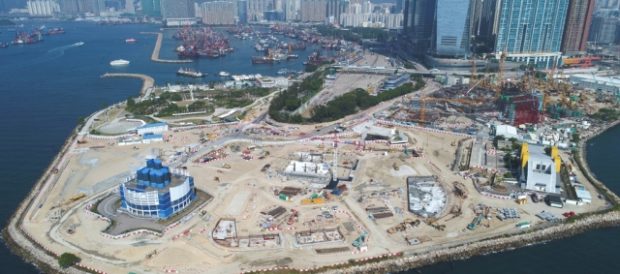The tragedy that is West Kowloon
(Next Magazine, 2017/01/26, A002, Second Opinion, Bill Stacey)
Is there a good solution to the Palace Museum controversy? How should we decide the right use of valuable land? Who should decide who builds and designs the monuments? These are questions calling for an answer.
Now most of the great historic monuments were personal projects – mausoleums, triumphal arches or even museums built to honor rulers or their victories and show their wisdom. Their distinction lies not in their reflecting a common or popular view, not in their utility, but in grandeur, which extracted a high price from those taxed to pay for them.
Sir John Cowperthwaite observed in his budget speech of 1968 that:
If people want consultative government, the price is increased complexity and delay in arriving at decisions. If they want speed of government, then they must accept a greater degree of authoritarianism.
He noted that over his many years in high office the trend had been towards more consultation and more delay in large projects. That was a trade-off which he supported, but he did not appreciate the criticism for delays.
Half a century on, this trend has continued. Major government initiatives get caught up in long and formal rounds of consultation that although they take time, do not resolve the differences of view revealed and documented in those consultations.
At a recent forum Jasper Tsang made the same comment that there is a trade-off between democratic processes and perceived efficiency. Again, by his account, he was firmly in favor of the democratic processes. He was critical of the current administration for paying lip service to alternative views and consultation.
There is an argument that democratic processes could be made more efficient, and that electoral systems could make it easier to form majorities. A wider franchise at all levels of government would add legitimacy to the decisions made and the trade-offs inherent in making decisions for the whole city.
And technology is making consultation much more efficient. For instance, it is now much easier to distribute information about a major project, and to identify the people with a direct interest and gather their views. It is even technically possible to hold plebiscites cost-effectively on almost every issue of momentous importance. Gathering Facebook likes and emoji reactions daily tells us fleeting reactions to partial information about a variety of issues, both vital and trivial.
Yet do we really want to live in a society where everything important is decided by the vote of others? The easier it is to vote and the lower the cost of expressing an opinion, the less considered and valuable that opinion is likely to be.
In most of the public consultations and controversies about the use of public resources, we are presented with a false choice. Either officials decide within their authority or the “public” decides through a process that is not so clear. This is often framed as a choice between efficiency in decision-making and democracy.
There is a more liberal and time-honored answer to the question: private ownership of land and property, with decisions about the use of resources made by individuals as they choose within the rule of law. Private ownership built the first railways that span continents, some of the finest museums and galleries, and the most spectacular architecture.
Private projects are not always on the scale of government monuments, and are not always aesthetically pleasing or to everyone’s taste. However, they are likely to be delivered on time and budget. They will at least be to the taste of those who commissioned them rather than a collective lowest common denominator of “likes”. The tragedy of the West Kowloon commons is that some of the most valuable land in the world has been left idle, even as billions have been spent on plans that shift across drafting boards and are probably influenced by political whim.
Sell the land. If buyers want to build a museum, wonderful. Let them choose their own architect.
Bill Stacey
Director
The Lion Rock Institute

